This is a list of Iranian officials with their titles.
Contents

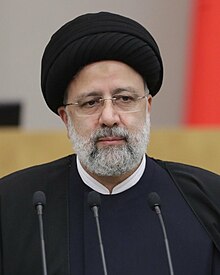


This is a list of Iranian officials with their titles.





The Expediency Discernment Council of the System is an administrative assembly of Iran appointed by the Supreme Leader and was created upon the revision to the Constitution on 6 February 1988. It was originally set up to resolve differences or conflicts between the Majlis and the Guardian Council, but "its true power lies more in its advisory role to the Supreme Leader." According to Hooman Majd, the Leader "delegated some of his own authority to the council—granting it supervisory powers over all branches of the government" following President Mahmoud Ahmadinejad's election in 2005.

Presidential elections were held in Iran 17 June 2005, with a second round run-off on 24 June. Mohammad Khatami, the previous President of Iran, stepped down on 2 August 2005, after serving his maximum two consecutive four-year terms according to the Islamic Republic's constitution. The election led to the victory of Mahmoud Ahmadinejad, the hardline mayor of Tehran, with 19.48% of the votes in the first round and 61.69% in the second. Factors thought to have contributed to Ahmadinejad's victory include mobilization of mosque networks and conservative/hardline voters, and a protest vote against corrupt elite insiders and for "new political blood". A loyal supporter of conservative Supreme Leader Khamenei, Ahmadinejad kissed the leader's hand during his authorization ceremony. Officials reported a turnout of about 59% of Iran's 47 million eligible voters, a decline from the 63% turnout reported in the first round of balloting a week before.

Mehdi Karroubi is an Iranian Shia cleric and reformist politician leading the National Trust Party. Following 2009–2010 Iranian election protests, Karroubi was put under house arrest in February 2011 – reportedly ordered by the Supreme Leader of Iran – without officially being charged, although he is accused of being a "seditionist" and "traitor". As of 2021, he is still confined to his house.

Mohammad Reza Aref is an Iranian engineer, academic and reformist politician who was the parliamentary leader of reformists' Hope fraction in the Iranian Parliament, representing Tehran, Rey, Shemiranat and Eslamshahr. Aref has also been heading the Reformists' Supreme Council for Policymaking since its establishment in 2015.He is currently member of the Expediency Discernment Council.

The Association of Combatant Clerics is an Iranian reformist clerical political party. It is regarded as a left-wing party within the Iranian political spectrum.
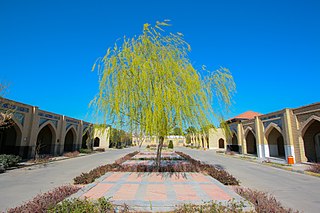
Behesht-e Zahra is the largest cemetery in Iran. Located in the southern part of metropolitan Tehran, it is connected to the city by Tehran Metro Line 1.

Ayatollah Mohammad Reza Mahdavi Kani was an Iranian Shia cleric, writer and conservative and principlist politician who was Acting Prime Minister of Iran from 2 September until 29 October 1981. Before that, he was Minister of Interior in the cabinets of Mohammad-Ali Rajai and Mohammad-Javad Bahonar. He was the leader of Combatant Clergy Association and Chairman of the Assembly of Experts and also founder and president of Imam Sadiq University.
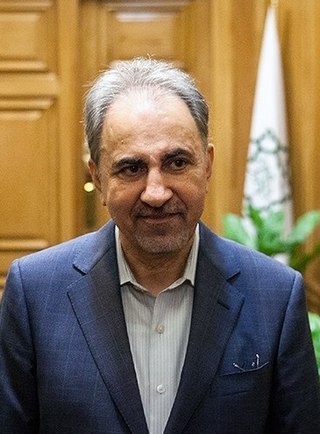
Mohammad-Ali Najafi is an Iranian mathematician and reformist politician who was the Mayor of Tehran, serving in the post for eight months, until April 2018. He held cabinet portfolios during the 1980s, 1990s and 2010s. He is also a retired professor of mathematics at Sharif University of Technology.

Gholam Reza Aghazadeh is an Iranian politician. Aghazadeh served as the Vice President for Atomic Energy of the Islamic Republic of Iran and the president of the Atomic Energy Organization of Iran from September 1997 until his resignation in July 2009. He is currently member of the Expediency Discernment Council.

The Imam Sadiq University is an Islamic private university in Tehran, Iran. Established in 1982, the goal of the university is to bridge the gap between Islamic researches and modern studies, especially humanities. Imam Sadiq was established on the premises that used to house the Harvard School of Management until the 1979 Iranian Revolution.
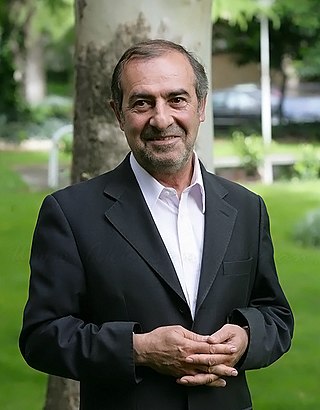
Morteza Alviri is an Iranian politician who served as Mayor of Tehran from 1999 to 2001.

The Cabinet of Iran is a formal body composed of government officials, ministers, chosen and led by a President. Its composition must be approved by a vote in the Parliament. According to the Constitution of the Islamic Republic of Iran, the President may dismiss members of the cabinet, but must do so in writing, and new appointees must again be approved by the Parliament. The cabinet meets weekly on Saturdays in Tehran. There may be additional meetings if circumstances require it. The president chairs the meetings. The Supreme Leader has the power to dismiss cabinet members like ministers and vice presidents, as well as the President, at any time, regardless of the Parliament's decisions.

The Supreme Council of the Cultural Revolution is a conservative-dominated body based in Qom, set up at the time of Ayatollah Khomeini. Its decisions can only be overruled by Iran's Supreme Leader. Most of its members were appointed by Ali Khamenei, Khomeini's successor.
The President of Iran is ex officio the chairman of the council.

Mohammad Shariatmadari is an Iranian politician and former Minister of Cooperatives, Labour and Social Welfare. He was in position of minister of Industry, from 2017 to 2018. He also served as minister of commerce from 1997 to 2005 in the cabinet of President Mohammad Khatami. He was campaign chairman of Hassan Rouhani for 2017 bid.

Hassan Rouhani, a moderate Iranian politician and former Secretary of the Supreme National Security Council, also known as the Diplomat Sheikh, launched his presidential campaign in March 2013. He was earlier expected to withdraw and endorse Ali Akbar Hashemi Rafsanjani after he registered, but he returned to the race after Hashemi's disqualification. The symbol of Rouhani's campaign was a key and his slogan was "Government of Prudence and Hope." On 15 June, he was elected as the president with 18,613,329 votes.
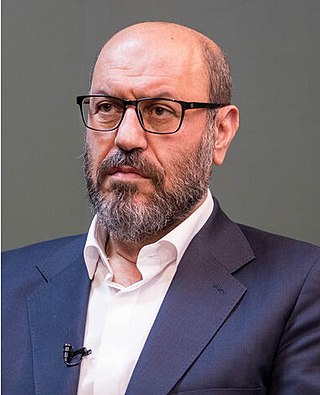
Hossein Dehghani Poudeh, commonly known as Hossein Dehghan, is a former IRGC air force officer with the rank of brigadier general and the former minister of defense of Iran. He was designated for the position by President Hassan Rouhani on 4 August 2013 and confirmed by the parliament on 15 August. He left the office on 20 August 2017.
Supreme Council of Cyberspace (Iran) (Persian: شورای عالی فضای مجازی) is a cyberspace-council which was formed on 26 February 2012 by the decree of Iran's supreme leader, Seyyed Ali Khamenei; and is obliged to establish "National Cyberspace Center of the country" to have an entire and up-to-date knowledge of internal/external cyberspace and in order to decide regarding "how to deal with the harms of the Internet".